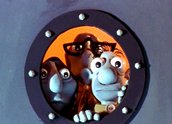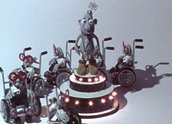


Harvie Krumpet (2003)
Synopsis
Harvek Milosz Krumpetzki (voiced by Julie Forsyth) is born with Tourette syndrome in a tiny snowbound hut, deep in the Polish countryside. Regarded as a miracle by his illiterate, peasant parents, Lilliana (voiced by Julie Forsyth) and Maciek, he is much loved, though not by his bully schoolmates. So Liliana teaches him at home. A series of tragic events unfolds: their home burns to a crisp, his parents are frozen to death, and the Germans invade. Young Harvek sails to far-off Australia and becomes Harvie Krumpet (voiced by John Flaus).
At one of his dead-end jobs, he is struck by a bully and, soon after, by lightning, and so begins a series of Harvie’s many hospital visits. Just as his resolve to go on living crumbles, he is inspired to 'seize the day’, joining a nudist colony and fighting for animal rights. In hospital again, this time for removal of his testicular cancer, Harvie meets the love of his life, Val, and they adopt a thalidomide baby, Ruby. They are happy, but not for long. Ruby emigrates, Val drops dead, and suddenly Harvie is alone again. A little demented and in a nursing home, Harvie succumbs to Alzheimer’s disease, yet this is where he truly finds himself. No amount of misfortune can thwart this little man – he embraces wisdom, nudity, love and living life to the full.
Curator’s notes
Harvie Krumpet won every major animation prize, including the Oscar for Best Animated Short, in a year (2003) which saw the release of blockbuster animated features such as Finding Nemo (2003) and Sylvain Chomet’s The Triplets of Belleville (2003). In this film, Adam Elliot, creator of Harvie Krumpet, moved from animated shorts Uncle (1996), Cousin (1998) and Brother (1999) to a more collaborative production in a longer format using digital technology to enhance his signature claymation technique.
A far more ambitious work than Elliot’s previous films, Harvie Krumpet has a stellar cast of voices – Geoffrey Rush, Julie Forsyth, John Flaus. The soundtrack ranges from the cheeky to the sublime, for example, 'God is Better than Football’ (contemporary composer Keith Binns) and 'Canon in D Major’ (composer Johann Pachelbel, c1680), to name but a few.
Assisting the animator-director were the inventive Sophie Raymond (character construction, modelling and lighting) and Michael Bazeley (modelling), both invaluable in bringing Harvie’s world to life. Despite the larger cast in front of, and behind, the camera, the intimacy and creative control of Adam’s smaller works is maintained, a rare quality in a production of this scope and length (22 minutes is a long time in animation).
Also rare in animation are the subjects of Tourette syndrome, cancer, Alzheimer’s and suicide. Elliot, the master entertainer, conjures them up like rabbits from a hat to make us wonder, laugh and applaud, as each misfortune turns into a kind of triumph for his characters, and especially Harvie, the 'little man’ of indomitable spirit. Harvie’s character reminds me of Charlie Chaplin’s 'little tramp’. Both seem to be insignificant and ordinary yet manage to re-direct the slings of outrageous fortune in their favour with hilarity and verve.
With a toe-tapping soundtrack (and a nod to Hollywood’s golden days of the musical) and an acute yet compassionate observation of human behaviour, Adam Elliot entertains as he makes us see his characters and their lives as special, lovable and extraordinary. He combines, in his inimitable way, such disparate elements as darkness and humour, tragedy and triumph, Alzheimer’s and living life to the full, so that we may learn more about what it means to be human.
- Overview
- Curator’s notes
- Video 3 clips
- Principal credits
- Find a copy
- Make a comment
- Map
- Add your review



